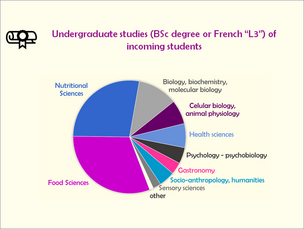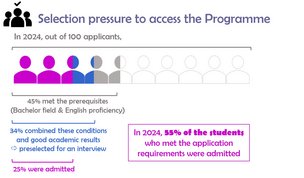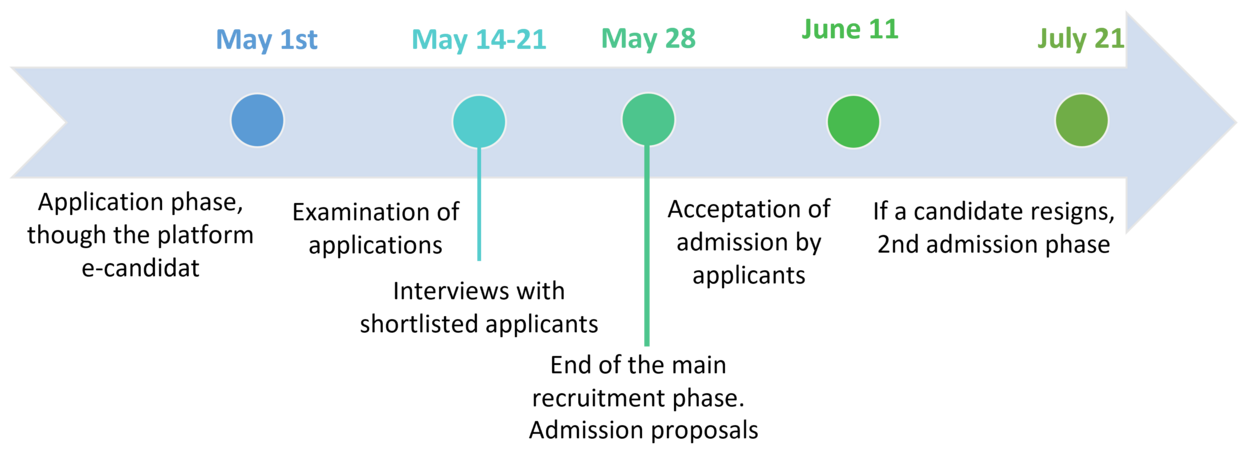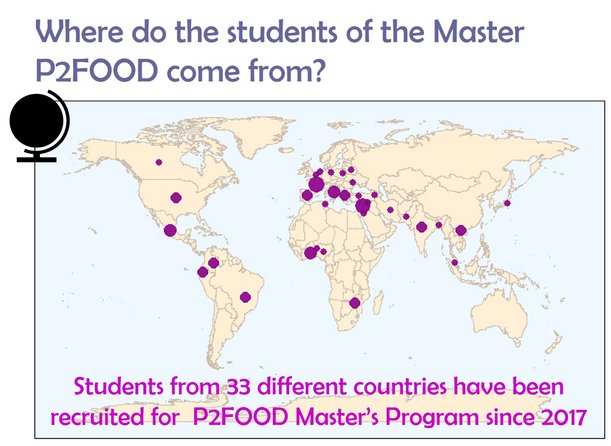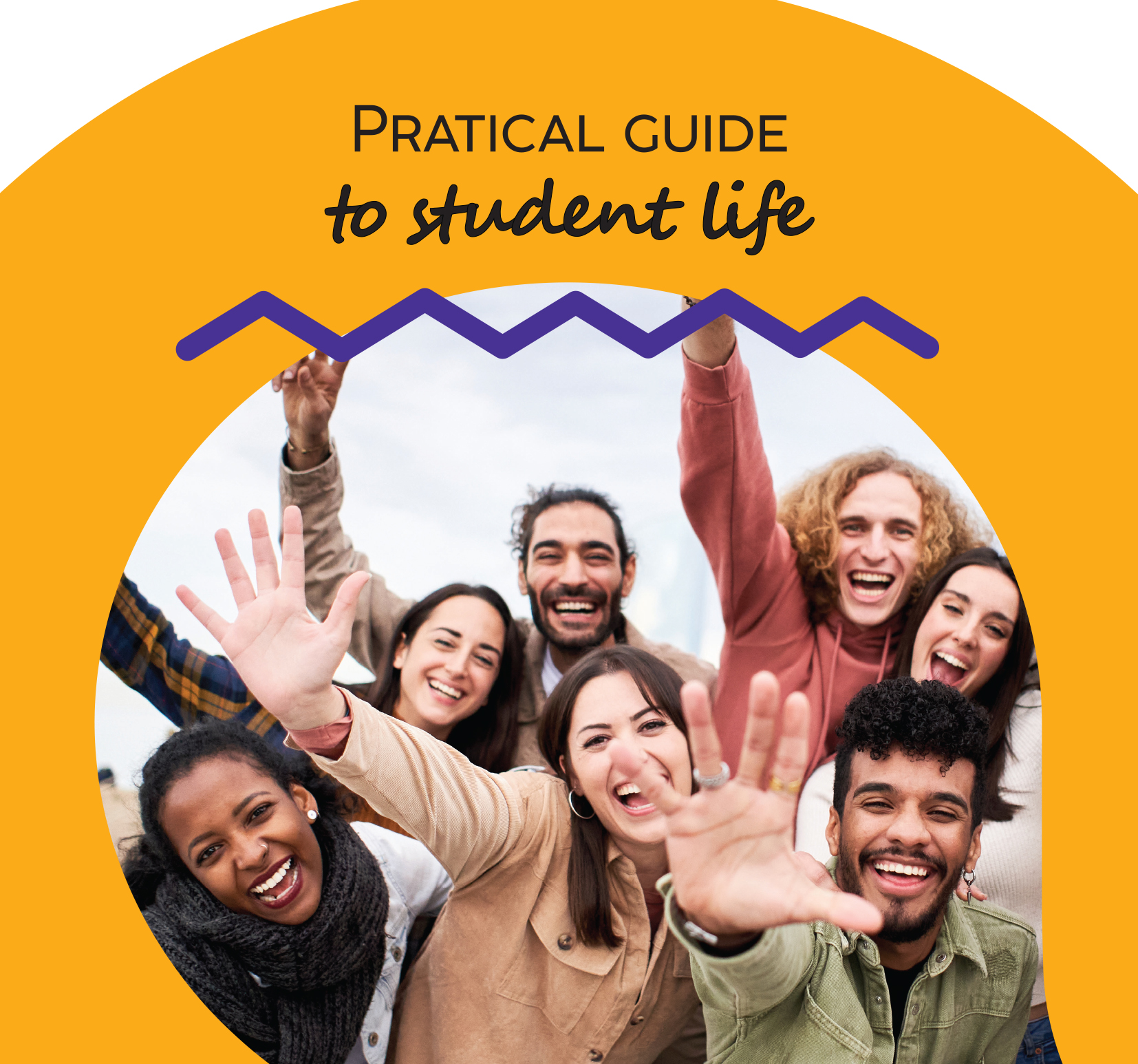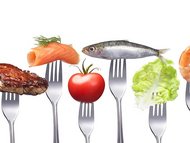
Physiological and Psychological Food Choice Determinants: P² Food
Latest News
APPLICATION CAMPAIGN FOR 2026/2027
- M1 & M2 P2FOOD:apply at ecandidat.institut-agro.fr from 2 March to 2 May 2026.
- International students must apply on the E-candidat platform even if they have already applied on Etudes en France.
- However, after admission, international students who are concerned will have to register on Etudes en France/Campus France for further steps.
BGF SCHOLARSHIPS
If you apply for a BGF scholarship to enter this Master, please do not hesitate to contact us for more information.
THE EIFFEL SCHOLARSHIP CAMPAIGN
- We do not accept Eiffel applications anymore. End of campaign = November, 15.
DURATION
Face-to-face courses
TAUGHT IN ENGLISH
B2 Level required
INTERNSHIP
Semester 4
Apprenticeship + "Contrat pro"
Alternation (apprenticeship/Apprentissage or contrat de professionalisation) will be possible in M2 for both French and nternational students (under conditions).
The responsibility for finding a company wishing to welcome the student and establishing the contract belongs to the student.
→ For more information, contact the P2FOOD email address.
What is the difference between Apprenticeship and "Contrat de Professionnalisation":
“Apprentissage”: https://www.service-public.fr/particuliers/vosdroits/F2918
“Contrat de Professionalisation” https://www.service-public.fr/particuliers/vosdroits/F15478
You have always wanted to know…
- How consumers choose their food
- Why we eat food which is neither the best for our health nor the environment
- Why people resist a change of diet
- What influence stress and mood have on food choices
- How cultural context can influence our food choices
This Master is made for you !
Our international Master P2FOOD shares the first semester in M1 with our other international Master MP² for common basis in food microbiology, sensory analysis and statistics in particular. After that, the teaching objectives, the course organisation and the contents are different. Note that the requirements to enter the Master P2FOOD are not the same than for MP². The two Masters lead to two different career paths. Make sure you consider it when applying to one of the Masters or both.
Presentation
P²food is a 2-year, course-based, full-time international research Master's Degree focused on the physiological and psychological determinants of food choice, offered by l'Institut Agro Dijon.
Food plays a much bigger role in consumers' lives than simply feeding them. Each day, humans make several food choices. Their diet has considerable impact on their nutritional status and health, but also on the environment. A greater understanding of the reasons for consumers' choice of foods is needed in order to set up effective programs and develop new products, to improve dietary patterns in line with recommendations, and to increase food sustainability.
Although seemingly simple, food choices are complex behaviors that depend on many factors and their interactions. The Master's program will provide you with multidisciplinary knowledge and skills that will enable you to address the cognitive, environmental, and social drivers of food choices, and identify actionable strategies to promote sustainable diets.
Everything you need to know to apply and join the programme
The application procedure will run from March 2 to May 2, 2026 for all students. The same dates apply for French students or international students holding of a French Bachelor’s degree.
It will be done via our platform E-candidat. At this stage, the platform Etudes en France-Campus France is not used.
https://ecandidat.institut-agro.fr/
Complementary form to fill in and download when applying- “Form_comp_P2FOOD_2025-2026”
- Identity photo
- Passport or identity card
- Copy of the highest diploma obtained with the diploma supplement
- For a degree in progress: photocopy of the year's transcripts and certificate of transcripts and certificate of completion (to be sent as soon as possible).
- Photocopy of the transcripts of the 3 years of Bachelor and 1st year of Master (if concerned); including your ranking
- Cover letter in English including your expectation from this master degree and your professional project
- Curriculum Vitae detailed in English, including information on work placement
- P2FOOD Supplementary Form (to download at on the E-candidat platform when applying)
- Copy of English certificate (if applicable)
- Letter of recommendation (2 max) (in connection with the requested training)
- Any document you wish to bring to our attention
FOR THE FIRST YEAR (M1):
You can apply to the 1st year of P2FOOD if you have completed a Bachelor's degree, L3 or engineer diploma in:
- biology (cell and molecular biology; cell biology and animal physiology, general biology, neurosciences, etc.),
- Food science and Nutrition
- Healthcare professions: medicine, pharmacyAdapted Physical
- Activity and health (APA-S) with a strong appetence in studying consumer’s dietary behavior
Students from other licenses must have followed specific modules or additional training:
- Students from psychology, psychosociology, or socio-anthropology interested in multidisciplinary approaches of food behavior (associating humanities, biology and neurosciences): knowledge in food science and cellular neuroscience is required. The training courses taken to acquire this knowledge must be mentioned in the CV,
- Students from dietetic training: knowledge of the functioning of the nervous system is required. The training courses taken to acquire this knowledge must be mentioned in the CV.
Bachelors in food technology, food engineering, hygiene and safety quality, microbiology, and agronomy do not give access to the P2FOOD master.
FOR THE SECOND YEAR (M2) - Direct enter:
- Have a basic knowledge of food and / or nutrition.
- Have a foundation in animal and / or human physiology
- Have a level of English B2 or equivalent, at least
- Have basic computer skills, be able to do simple operations and use basic functions in Excel
- Have a basis of statistical analysis
- Skills: ability to work in a group
Your admission may be conditional upon the independent study of a catch-up program adapted to your profile and proposed by the instructors.
Don't see yourself in this list? No problem. The teaching team is open to discovering new profiles. Don't hesitate to apply.
Click on the graphs below to see the background of students and graduates from 2018 and the selection to admission.
1. Send your application on e-candidat. Depending on your profile and background, you may apply to both M1 and M2 (two different applications on the same platform).
2. The administrative team will check your documents and define if your application is complete or not. If not, you will be contacted to provide the missing documents. Tip: From the moment the statud “complete” is given to your application on e-candidat, an answer must be sent within the two following months.
3. Your files are sent to the Selection Committee who will review it during their meetings.
4. The Selection Committee may answer in different ways:
- Not selected → The students are informed quickly on e-candidat
- Pre-selected for an interview → Requires some extratime to define the interviews schedule.
- Fully admitted (concerned very specific profiles such as Eiffel scholars or former students…) → informed quickly on e-candidat
- Not selected for M2 but proposed for a pre-selection interview in M1 (background in M2 not adapted) → the student is contacted to define wheher he/she agrees on this proposition and is willing to be interviewed. If not, a refusal is officially given. If yes, the student is included in the next pool of interviews.
5. In case you are invited for an interview: It is a videoconference that lasts about 20 min, in English. During the interview, the Selection Committee will ask questions about the the student's background, his/her professional objectives, etc.
→ If you have a disability (all types of disabilities) and this may have an impact on the interview, you can, if you wish, inform the P2FOOD team in advance by writing to the contact address (right upper frame)
6. The Selection Committee informs the administrative team about the final decision
7. The final decision is informed on e-candidat. In case of admission, the student will have a delay (usually 10 to 15 days - may vary) to confirm on e-candidat this proposition. If not confirmed, the proposition will be withdrawn.
To ensure the international profile of our graduates, we have chosen to offer a Master's degree 100% taught in English and a recommended 6-month internship abroad, if possible.
In addition, it was important for the programme to be able to welcome international students with different academic, professional and personal backgrounds.
As showed in this map, international students come from all horizons since 2017.
The programme being taught 100% in English, the expected English level is B2.
Candidates for whom English is not their mother tongue or who haven’t done their studies in English will have to give a certificate to attest of their English level. The following tests will be accepted as a certification of the required English level (valid certificate necessary) :
- CECRL : level B2 minimum
- TOEFL : 87 points minimum
- TOEIC : 785 points minimum
- BULATS : 60 points minimum
- First Certificate English of Cambridge
- Bright Language Test : level 3 minimum
- IELTS : 6
- Duolinguo English Test: 110-125 minimum
- EF SET 50 MIN or 90 MIN (15 min not allowed) - LEVEL B2
Such a document is not necessary for candidates for whom English is their mother tongue, or who have validated a minimum of one semester in English. However, in both cases, the candidates must absolutely mention it in their application file and bring any proof (school certificate for exemple, transcripts) to confirm it.
There is no requirements of French level to enter the Master. International students will follow French courses (FLE - French as a Foreign Language) when entering the programme. If you have bases in French, follow courses in the past or even have a certification in FLE, please indicate it in your CV and add any proof of it, in order to anticipate registration to FLE courses.
TUITION FEES
Differenciated prices for international students will be applied. The Higher Education and Research Ministry has just voted the new tariffs for 2025/2026.
- For French and UE students, the tuition fees was around 254€/year for the tuition fees + ~ 105€/year for the Student Life contribution fee.
- For international students (non UE), the tuition fees was around 3941€/year + ~105€/year for the student Life contribution.
The amounts may vary from year to year based on the Ministry's decision.
SCHOLARSHIPS
Our institution does not offer scholarships. However, financial support could be provided under circumstances for few months. Also, students have the possibility to apply to CROUS social funds, upon arrival and after meeting a social worker.
Usually, the international P2FOOD students have to financially cover expenses for 3 full semesters: semesters 1 to 3 done in Dijon. Semester 4 implies a 5-6 months internship in France or abroad. If done in France, hosting institutions/companies must pay trainees 4.35€/h (hourly rate in 2024).
Students on a work-study contract with a company receive a monthly salary (based on various criteria).
To find scholarship opportunities, you can visit the Campusbourses website : campusbourses.campusfrance.org/fria/bourse/
Two others with some extra opportunities (broader scope but more difficult to find at the Masters' level)
(1) www.scholarshipportal.com/
(2)https://euraxess.ec.europa.eu/funding/search
(3) fondationdelavocation.org/poser-sa-candidature
THE EIFFEL SCHOLARSHIP
A student does not apply on his own to the scholarship of Excellence EIFFEL. He/she is supported by a Higher Education Institution. Each institution supports a limited number of candidates. This application to this scholarship is highly competitive.
Website: https://www.campusfrance.org/fr/le-programme-de-bourses-france-excellence-eiffel
For this programme, we will consider candidates with transcripts of an excellent level - Rank A+ - 80% (First class Honors) and with a profile that fits with the requirements.
Documents to send us to apply:
- A photocopy of your passport (identity page) or identity document.
- Your curriculum vitae, written in English (1 to 2 pages).
- Your diplomas and ranking: this must specify your performance, which must be justified by: distinction, ranking rank, situation within the promotion, number of students in the promotion, diplomas with indication of the specialty, the date obtained, mentions and final grades certified by the establishment.
- Your transcripts from the last three years referring to a course completed both in France and abroad.
- English certificate or diploma (see the section about language requirements for the accepted certificates)
- Your professional project, written in English (1 to 2 pages). You must write his project in a form that allows you to explain the choice of studies in France in relation to previous studies and future professional career. This presentation may possibly be supported by an opinion from people outside the establishment, for example belonging to a company.
If your profile is interesting, an interview (at distance) will be done with the pedagogical team. At the end, they will accept or not to support your application to Eiffel.
Here is the timeline decided by our institution:
- Send your documents as soon as possible.
- Interviews and decisons will be made by November 1, 2025.
- The candidate get access to the Eiffel platform and submit its documents by November 15, 2025
- The supervisor of the programme checks the documents and validate on the Eiffel platform by December 10, 2025.
- The international relations office checks and confirms the application on the Eiffel platform by January 8, 2026.
COSTS OF LIVING IN DIJON
Apart from the tuition fees and CVEC contribution that you have to pay every year (CVEC = 100€ - 2024/2025 - may change every year), you have to consider the cost of living in Dijon.
For more information: https://institut-agro-dijon.com/life-linstitut-agro-dijon/living-in-france
The two-year programme at a glance
Our approach is student-centered and participative. It combines lectures, seminars and practicals, workshops and individual/team projects. The modules below are indicative of those offered in this programme. This list is based on the current organization and may change year to year in response to new needs in the food industry.
For more information on the pedagogical team, click on their names and discover their professional webpage.
| Unit | Module | Lectures | Tutorials | Practicals | Visits | Coordinator(s) | |
| 1st year Semester 1 | Toolbox (6 credits) | * Team building and intercultural communication | 16 | G. Arvisenet | |||
| * Computing tools | 6 | ||||||
| * Bibliographical research and analysis of scientific articles | 2 | 6 | |||||
| * Discovering the local research environment, visiting laboratories | 4 | 5 | |||||
| Statistics (6 credits) | * Descriptive and non-parametric statistics | 8 | 12 | L. Dujourdy | |||
| * Parametric statistics - Introduction to multivariate statistics | 12 | 12 | |||||
| Perception and introduction to sensory evaluation (5 credits) | * Discriminative testing, evaluation of a simple sensory variable and introduction to descriptive profile | 12 | 4 | H. Labouré C. Dacremont | |||
| * Hedonic and Just-about Right tests | 4 | 9 | |||||
| * Psychophysics and physiology of peripheral perception (olfaction and gustation) | 3 | 8 | |||||
| Food composition and nutrition (6 credits) | * Food ingredients, structure and analysis | 12 | 12 | C. Loupiac L. Demizieux | |||
| * Covering energy and nutritional needs | 16 | 8 | |||||
| Concept of microbiological risk, food hygiene, fermenter, growth analysis (3 credits) | * Basis in food microbiology : food hygiene and pathogenic micro-organisms | 4 | 5 | S. Guyot | |||
| * Basis in food microbial processes: data analysis and bioreactor | 5 | 6 | |||||
| Social and cultural approach of food (6 credits) | * Sociology of eaters | 14 | 6 | M. Duboys Delabarre E. Ricaud-Oneto | |||
| * Sensory anthropology | 12 | 8 | |||||
| 1st year Semester 2 | Neuro-physiological regulation of food behavior (4 credits) | * Physiological basis of homeostatic hunger | 20 | N. Khan F. Datiche | |||
| * Neuro-physiological basis of hedonic hunger | 12 | 12 | |||||
| * Cognitive psychology | 10 | ||||||
| * Neurobiology of memory and emotions | 20 | 2 | 4 | ||||
| Descriptive sensory analysis (3 credits) | * Multivariate statistics | 5 | 9 | V. Danten | |||
| * Sensory profile and rapid descriptive sensory tests | 2 | 6 | 10 | ||||
| Food texture and aroma (3 credits) | * Properties and analysis of aroma compounds | 8 | 6 | H. Labouré | |||
| * Food structure and rheological properties | 2 | 4 | |||||
| * Social psychology | 10 | 10 | |||||
| Discovering business and research (4 credits) | * Job hunting | 16 | G. Arvisenet | ||||
| * Scientific writting | 10 | ||||||
| Discovering business and research | * Discovering career prospects | 10 | |||||
| * Preparation of the internship | 4 | ||||||
| Internship | * Project management | 6 | 6 | ||||
| * 2- month Internship | |||||||
| 2nd year Semester 3 | Professional skills (5 credits) | * Business world and entrepreneurship | 8 | G. Arvisenet | |||
| * Digital tools | 8 | ||||||
| * Ethic and deontology | 10 | ||||||
| * Professional communication, scientific debate and controversy | 6 | ||||||
| * Seminars and conferences, preparation for professional project | |||||||
| Oral Perception and MultiSensory Integration (5 credits) | * Introduction and Oral Cavity | 4 | 2 | H. Labouré | |||
| * Food Oral Processing and perception | 14 | 10 | 2 | ||||
| * Multisensory integration | 10 | 0 | 3 | ||||
| Anthropology of food (5 credits) | * Qualitative methodologies | 12 | 12 | E. Ricaud-Oneto | |||
| * Theoretical approach and case studies | 12 | 6 | |||||
| Consumers in the food transition (5 credits) | * Marketting and consumer behavior | 4 | 6 | J. Melendrez | |||
| * Measures to support consumers in the food transition | 18 | ||||||
| * Intervention studies to support changes in eating behaviour (vegetalization…) | 4 | 6 | 6 | ||||
| Eating behavior in specific populations (5 credits) | * Development psychology and cognitive processes | 12 | C. Sulmont-Rosse | ||||
| * Eating behaviors across lifespan | 10 | 10 | |||||
| * Other specific populations | 12 | ||||||
| Cutting-edge tools for studying the physiology of feeding behaviour, from animals to humans (5 credits) | * Cutting-edge tools for studying the physiology of feeding behaviour, from animals to humans | 28 | 8 | 6 | F. Datiche | ||
| 2nd year Semester 4 | Internship (30 credits) | ||||||
Job openings
As a student in this Master’s program, you will gain in-depth knowledge about food properties and fundamental insights about human food behaviour. You will acquire sensory and consumer research methodology. You will come to understand the mechanisms of hunger, satiety and satiation, and the factors involved in palatability. You will study the influence of stress and mood on food behaviours, and explore the ways in which cultural context influences food choices. You will examine the importance of representation and consumer attitudes towards food, as well as the reasons for resistance to dietary change. You will understand why it is necessary to take on this issue in an interdisciplinary way.
This Master’s Degree aims at providing students with job-relevant competencies and skills for a career in industry (project leader or research engineer in nutrition; consumer science and R&D departments of international companies) or an academic position (food and consumer research; sensory and cognitive neuroscience research; food, nutrition and health research, etc.)




5 questions to our graduates...
Click on the student's name to read their answers
Internships
The master’s course comprise two mandatory internships, of 2 and 6 months. Internship can be held in a university, a research institute, a public institution, a company, a consultancy firm, an association, or a non-governmental organization.
In research labs and universities:
- Implementing tasting sessions in nursing-home: impact on appetite and food intake
- Brain-gut interaction on the regulation of food intake
- Socioeconomic position and the effect of energy content labelling on self-served portion size
- The Influence of odors on Food Exploration in Children
- Social modeling: effect of vegetarian dining partner on omnivore food behavior
- Representation of insect as food. A cross-cultural perspective
In companies:
- Impact of vegan diet on taste perception and implication for product development
- Implementation of solutions to reduce the intention - behavior gap in regimes to loose weight
- Comparison of food practices of vegetarian and flexitarian people, using social-media
- How do consumers define the concept of naturality?
- Consumers’ Perception of Sugars and Sugar Substitutes
28% of the students of the Master P2FOOD co-authored a scientific article on a project they worked on during the Master’s programme:
2024
|
|
2023
|
|
2022
|
|
2021
|
|
2020
|
|
2019
|
|
Contactez-nous
Tuition fees are reviewed annually.
Tuition fees for the 2025/2026 academic year are :
- for EU students enrolled in initial training in M1 and M2: 254 euros
- for non-EU students enrolled in initial training in M1 & M2: 3,941 euros
